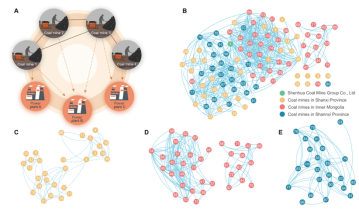Recently, Professor Sun Yongzheng from the Jiangsu Provincial Center for Applied Mathematics (China University of Mining and Technology), Professor Zhou Fubao from the China Academy of Safety Science and Technology, Professor Lin Wei from Fudan University, Professor Wen Guanghui from Southeast University, Professor Sandro Azaele from the University of Padua (Italy), and Dr. Feng Yu from the Coal Big Data Research Institute collaborated to propose a theoretical framework for studying the resilience of China's coal energy supply market from the perspective of complex system science. The study explores the impact of energy decarbonization policies on the resilience of the coal energy supply network under the "carbon neutrality" background. The research results can provide theoretical references for formulating energy policies under the goals of "carbon peak" and "carbon neutrality". The relevant achievements were published in Research under the title "Quantifying the resilience of coal energy supply in China towards carbon neutrality" (https://doi.org/10.34133/research.0398). Professor Sun Yongzheng is the first author, Professor Zhou Fubao and Professor Lin Wei are co-corresponding authors, and China University of Mining and Technology is the first completing unit. This research was funded by the National Natural Science Foundation of China.

Coal Market Network of Major Coal-Producing Areas in China
Facing the challenges of global climate change and environmental pollution, China, as a major coal-consuming country, is actively promoting the transformation of its energy supply structure to achieve the goals of "carbon peak" and "carbon neutrality". China's energy supply has long relied on coal, and the stable supply of coal is the cornerstone of China's energy security. Current research focuses more on the impact of the use of renewable energy on carbon emissions and the relationship between external factors and carbon emissions, lacking an overall understanding of the impact of energy decarbonization policies on the resilience of the energy market itself. At the same time, most existing studies regard the coal energy market as a whole, ignoring the complex competitive and cooperative relationships among coal energy enterprises, and lack systematic research on the resilience of the coal energy market from the perspectives of complexity science and network science.
From the perspective of network science, the paper proposes a theoretical framework for analyzing the resilience of coal energy networks and quantitatively studies the impact of energy decarbonization policies on the resilience of China's coal supply market under the background of "carbon neutrality". Based on real transaction data between coal enterprises and power plants in China, the study abstracts each coal enterprise as a node, considers the competitive relationship between coal enterprises supplying coal to the same power plant, constructs a China coal energy supply market network (as shown in the figure), and establishes a mathematical model describing the evolutionary dynamics of the coal market network.
The paper uses dimensionality reduction methods to reduce the complex high-dimensional network dynamic system to a low-dimensional dynamic system. The analysis of the reduced-dimensional system can effectively capture the resilience changes of the original high-dimensional system, thereby quantitatively studying the resilience of the energy supply market. The paper analyzes the impact of real disturbances such as energy supply decarbonization policies (e.g., closing small coal mines), cancellation of coal contracts between coal enterprises and thermal power plants, and structural characteristics such as the modular distribution of Chinese coal mining enterprises on the resilience of the coal supply market. The study found that closing small coal mines can not only reduce the risk of coal mine safety accidents but also improve the resilience of the coal market, theoretically verifying the effectiveness of China's existing coal regulatory measures. The paper proposes several policy recommendations, such as encouraging power plants to establish long-term contracts with coal enterprises, reducing inter-provincial coal transactions, and gradually reducing coal supply, to ensure the gradual achievement of energy decarbonization goals while maintaining stable energy supply.
This paper is the first to study the resilience of China's coal energy supply market under the background of carbon neutrality from the perspective of complex system science. It provides a new perspective for understanding and analyzing the resilience of energy supply markets. The proposed method has good generality and scalability and is expected to be applied to other energy markets to further explore the general laws of different energy markets, providing strong theoretical support for energy security and carbon emission regulation under the future goals of carbon peak and carbon neutrality.
In recent years, Professor Sun Yongzheng has achieved a series of research results in the field of network dynamics, published more than 60 SCI-indexed papers in international academic journals in mathematics, physics, and control fields such as Physical Review Letters, SIAM Journal on Applied Mathematics, and IEEE TAC, and undertaken more than 10 projects funded by the National Natural Science Foundation of China and enterprise-commissioned projects.
Research is a high-level comprehensive scientific journal co-founded by the China Association for Science and Technology and the American Association for the Advancement of Science. It is the first cooperative journal of Science since its establishment in 1880. Through Science's high-impact international communication platform and rich international high-end academic resources, the journal's international reputation and influence are rapidly increasing. In 2023, its impact factor was 8.5, ranking in the first district of comprehensive journals of the Chinese Academy of Sciences.